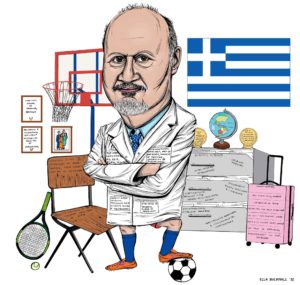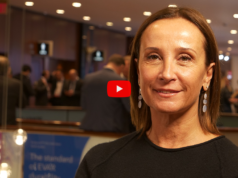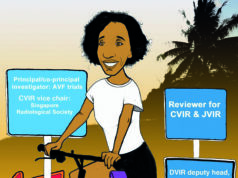 The first person to perform a transjugular intrahepatic portosystemic shunt procedure (TIPS) in Greece, Adam Hatzidakis discusses his career-long love affair with the hepato-biliary-pancreatic system, and describes the delights and difficulties of being a trailblazer in the interventional radiology (IR) space. Speaking seven months after the SARS-CoV-2 virus first caused multiple governments to impose national lockdowns and resulted in widespread international travel bans, Hatzidakis also hopes that the shift to digital conferences is here to stay, at least in part, “so that more colleagues may benefit from the international educational opportunities on offer”.
The first person to perform a transjugular intrahepatic portosystemic shunt procedure (TIPS) in Greece, Adam Hatzidakis discusses his career-long love affair with the hepato-biliary-pancreatic system, and describes the delights and difficulties of being a trailblazer in the interventional radiology (IR) space. Speaking seven months after the SARS-CoV-2 virus first caused multiple governments to impose national lockdowns and resulted in widespread international travel bans, Hatzidakis also hopes that the shift to digital conferences is here to stay, at least in part, “so that more colleagues may benefit from the international educational opportunities on offer”.
What initially attracted you to interventional radiology (IR)?
I was initially attracted to radiology because I loved imaging and trying to find the “pathological hidden in the physiological”. Then I discovered interventional radiology, where I had the possibility to “clean” the physiological from the pathological.
Have you had important mentors for you throughout your career?
Yes, several. To start, my first professor, Nicholas Gourtsoyiannis, in Heraklion, Crete. He taught us the importance of becoming clinical radiologists, and how to have a presence on the international stage. Together with my tutor and friend Spyros Karampekios, we performed the first IR procedures in Heraklion, back in 1993.
Next, my IR teacher, Panos Galis, at the AirForce Hospital in Athens, Greece. He was a Greek pioneer in vascular IR, and I learned many tricks from his experience.
Another three titans of IR who have been personally important: Plinio Rossi from Rome, Italy; Rolf Guenther from Aachen, Germany; and Andreas “Andy” Adam from London, UK. Beside great IR teaching, in London I learned how to manage, in Aachen how to organise, and in Rome how to improvise. All experiences were of great value.
Why are you specifically drawn to the hepato-bilio-pancreatic system? What do we still have to learn about treatment in this system?
In the era of magnetic resonance cholangiopancreatography (MRCP), endoscopists have fewer possibilities to practice so many endoscopic retrograde cholangiopancreatographies (ERCPs), with the result that new doctors are less well trained. So, radiologists usually have more to do. Biliary IR is delicate work, offering you a lot of challenging cases. Performing malignant cases is good training for tough benign cases.
In 1996, you performed the first transjugular intrahepatic portosystemic shunt procedure (TIPS) in Greece. How did this come about?
That was my passport to the future. The case went well, although the patient was not able to survive for a long time. Performing this case helped to create a lot of respect for my work and IR more generally, but the expectations others have from you can become a very heavy burden. I learned that I had to constantly perform at a high level, and try to be involved in novel procedures, so that everybody could benefit from this. I think one can feel that they have to fulfil the obligation to continue working at a high scientific level in order to show the younger generation of interventional radiologists their way to the top.
In 1998, you were one of the first interventional radiologists in Greece to perform percutaneous liver tumour ablation. What are the most exciting and the most intimidating aspects of working at the vanguard?
This is the reason why I like working in University Hospitals. Patients and other medical specialties can trust you more easily when it comes to new methods and techniques. Of course, you have to perform the procedures well and safely, with nice results to keep a good and trustful name. Sometimes this is not enough, because other specialties do not want to move to new methods and lose control of their patients, or stop performing what is common practice to them in favour of IR methods. The same happened in the old days with oncologists who did not want to stop chemotherapy protocols and send patients to radiofrequency ablation (RFA) in order to calculate total survival rates. The same thing still happens now with other IR techniques such as vertebroplasty, varicocele and fibroid embolization, and I am afraid it will also happen with prostatic artery embolization.
Could you describe a particularly memorable case?
Yes, definitely the first TIPS procedure done in Greece. I was still a last year radiology resident and I was asked to try to performed it. There were five university professors outside the angiography suite, and I needed five hours to complete the case. I would of course never have managed it without their trust and the good help of two senior radiologists who were my teachers and the backbone of our department.
As deputy chair of the Cardiovascular and Interventional Radiological Society of Europe (CIRSE) programme committee 2019–2021, and upcoming chair of the same committee, what are your goals for scientific education over the next two years?
Providing medical education has become difficult due to travelling restrictions. But this problem has convinced international medical societies to transition to a digital education format. Our last CIRSE Summit (12–15 September, virtual) is such an example. The set-up we managed to create in such a short time and the transformation of the programme from a live event to a digital one was a big challenge.
I am confident that this shift to online learning has come to stay. The future will be full of hybrid congresses with both live and distant participation. I hope during the next two years that we will be able to go back to face-to-face events, as these are very important for communication between doctors and industry, but also maintain some remote-learning capabilities, so that more colleagues may benefit from the international educational opportunities on offer.
How has the COVID-19 pandemic impacted IR this year, and do you foresee a lasting change to the discipline?
It was a hard time for everybody. Our University Hospital in Thessaloniki closed for almost every other activity. We were asked to perform only emergency cases. But due to the fact that the surgical departments also decreased their activities, we managed to keep a decreased but adequate number of cases to continue our clinical work. I am confident that the role of IR departments will come out of this crisis more powerful than before, because we provide minimally invasive solutions without need for intensive care unit (ICU) beds.
On a personal level, what are the central preoccupations when treating patients during a global pandemic?
Be aware of COVID-positive patients, treat them carefully, and keep your staff safe.
In your opinion, what is the most interesting research coming out of Greece in the IR space right now?
Greek interventional radiologists try hard to maintain a high level of medical services, and to convince patients and other physicians about the possibilities our treatments can offer. Research has always been a tough task in our country, usually due to a lack of financial resources. Nevertheless, there are Centres of Excellence like in Patras, where a lot of research work is conducted in the peripheral vascular disease space and in arteriovenous fistula creation. Athens also has a couple of centres working on interventional oncology therapies in the thorax, abdomen, and musculoskeletal systems. We in Thessaloniki are trying to create a Centre of Excellence for primary and secondary liver tumours, in good cooperation with a local transplant centre. I am pretty confident that this cooperation will be fruitful in the future.
What are the main challenges when treating HCC patients via IR techniques? How and why is interdisciplinary collaboration important?
HCC patients are quite complex. Experienced hepatologists, together with surgical oncology and transplant colleagues, are needed to decide how to treat every case. The cooperation of hospital tumour boards demonstrates the importance of being a clinical radiologist; being treated as an equal is the best reward for your work.
What are your hobbies and interests outside of medicine?
I love traveling and learning about other cultures. I am a big fan of various sports, especially soccer, basketball, and tennis, which I also played myself. I enjoy good company with my beautiful family and many good friends, which I am blessed to have. Hatzidakis Hatzidakis Hatzidakis Hatzidakis Hatzidakis Hatzidakis Hatzidakis










